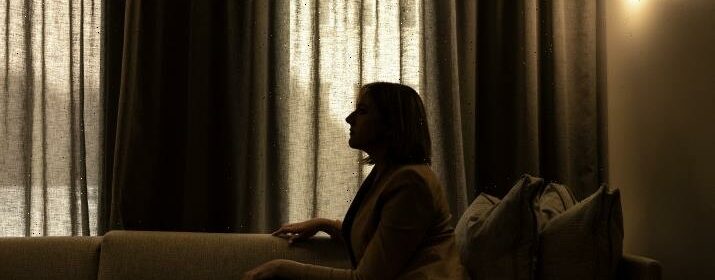‘I didn’t realise it wasn’t normal’: The ‘chilling’ impact of family violence on children

Kate* was seven months pregnant with her fifth child when her partner threw her into a wall. The violence “was escalating really badly,” so in the middle of the night she woke her children, ushered them silently into the car, and drove away.
She is still dealing with the aftermath of the abuse. So are her children, who are learning to make sense of all that happened. One son told her, “I remember grabbing the phone and hiding under the bed. I wanted to call the police but I was too scared.”
A new study of children’s experiences of family violence has shed light on the trauma they suffer and the lack of help available, with survivors saying it led to decades’ worth of emotional damage, but their attempts to get help were either ignored or made the abuse worse.
*Kate is a domestic violence survivor. She is still dealing with the aftermath of the abuse and so are her children. Credit:Louise Kennerley
The joint project between Barnardos and Sydney University asked adult victims about their memories of abuse. Most respondents were women, and the abuse – mostly verbal, physical and psychological – was perpetrated by their father or stepfather.
Almost half were younger than four when it began. For two-thirds, the abuse lasted most of their childhood. Some had no idea the violence wasn’t normal until they were older. Others were weighed down by the burden of the secret they were ordered to keep.
For years afterwards, many of those children have struggled with low self-esteem, not feeling safe and lacking trust in others. Some sought help at the time, from their mother, siblings, a friend or counsellor. But mostly their attempt didn’t work – either nothing changed or the abuse got worse.
“After I told my teacher that I would cop a beating if I got bad grades, my third-grade teacher gave me all As in my end-of-year report card,” said one. “Whilst I appreciate the gesture, there was no follow-up afterwards.”
Sometimes, the person they told did not intervene. Other times, they accused the child of making it up, the survivors told the study. Many were too afraid to tell anyone, worrying it would make things worse or feeling there wasn’t anything anyone could do.
“You cannot be in a household with domestic violence without being involved, you’re hearing it, you’re seeing it. We are still at the early stages of understanding what that means for kids.”
“I never told anyone about it because it was shameful,” said one respondent. “I didn’t want to embarrass my mum, our family, and my dad even though he was the main aggressor.” Another said, “I didn’t realise that it wasn’t normal. I had seven siblings, we looked after one another.”
University of Melbourne Professor Cathy Humphreys said the survivors’ stories left no doubt of the long shadow family violence cast into adult life, and the “chilling effects it had in childhood”.
“The response to children and young people asking for help was distressingly poor. They were not believed, they were punished further, their perceptions were questioned, they were identified as liars. The alternative of calling out abusive adults was too hard for many of the professionals the children encountered,” Humphreys said.
The problem is widespread; estimates suggest about 2.5 million Australian adults experienced abuse before the age of 15, the report said. Past research has also shown there’s a delay of six years between services becoming aware of violence in a home, and the children getting support.
National Children’s Commissioner Anne Hollonds said children have “been invisible, historically” in the domestic and family violence field. “It’s seen as between adults, without recognition that children are there, and they’re not just witnesses,” she said.
“You cannot be in a household with domestic violence without being involved, you’re hearing it, you’re seeing it. We are still at the early stages of understanding what that means for kids.”
Barnardos’ Head of Knowledge, Outcomes and Research, Robert Urquhart, said the study showed child victims of family violence needed immediate and effective trauma-informed counselling and therapy. “Adults fail to notice the signs of abuse and intervene,” he said.
The chief executive of Barnardos, Deirdre Cheers, said most family violence organisations were focused on adults. “Working with children is specialist work, the areas of developmental and educational psychology are clear that children have specific needs,” she said.
Kate’s children are recovering from the trauma of watching their stepfather terrorise their mother. “But I see that a lot of their trauma could have been dealt with earlier on, through accessing a child psychologist or a play therapist,” she said.
Families could access 10 free sessions with a doctor’s referral, but “when you’re coming out of this, you need it weekly,” she said. “Ten sessions is not even going to scratch the surface. Trauma cuts deep and has a way of bubbling back up. Children need a long-term solution with long-term outcomes.”
*Kate is a pseudonym to protect her identity.
National Sexual Assault, Family & Domestic Violence Counselling Line: 1800 737 732.
The Morning Edition newsletter is our guide to the day’s most important and interesting stories, analysis and insights. Sign up here.
Most Viewed in National
From our partners
Source: Read Full Article
